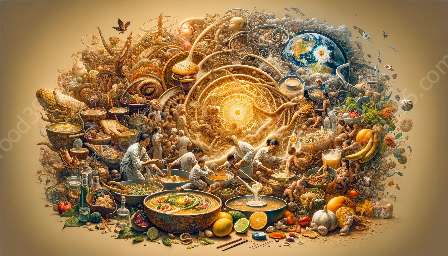Food is more than just sustenance; it is a powerful tool that can facilitate social integration and shape the identity of migrant populations. An understanding of the connections between food, migration, culture, and history is essential to appreciate the impact of food on social cohesion and identity formation.
Food and Migration
When individuals migrate to a new country, they often bring with them their culinary traditions and preferences. These food practices not only provide migrants with a sense of familiarity and comfort in an unfamiliar environment but also serve as a means to connect with their fellow migrants and the local population. Sharing a meal can bridge cultural gaps and create a space for mutual understanding and a sense of belonging.
The act of preparing and consuming traditional dishes can also serve as a form of self-identification, allowing migrants to maintain a connection to their roots while adapting to a new culture. Additionally, the exchange of recipes and cooking techniques between migrants and locals can foster cross-cultural exchange and mutual appreciation.
Food Culture and History
The culinary landscape of any region is deeply rooted in its history and culture. Through the lens of food, migrant populations can gain insight into the traditions, values, and social structures of their new home. By engaging with local cuisines and culinary practices, migrants can develop a deeper understanding of the historical and cultural context in which they are now living.
Furthermore, the act of cooking and sharing meals can become a vehicle for preserving and transmitting cultural heritage across generations. Through the preparation of traditional dishes, migrant communities can maintain a sense of cultural continuity and pass down their culinary knowledge, thus perpetuating their cultural identity in a new environment.
Social Integration and Identity Formation
Food plays a pivotal role in social integration by providing a common ground for individuals to come together, share experiences, and form connections. In migrant populations, communal meals and food-related events can serve as platforms for fostering social ties, breaking down barriers, and building a sense of community.
Moreover, the acceptance and appreciation of diverse cuisines within a host society can signify an acknowledgement of the cultural richness brought by migrants. This recognition can contribute to the development of a more inclusive and diverse social fabric, where individuals from different backgrounds can interact and coexist harmoniously.
Conclusion
Food serves as a catalyst for social integration and identity formation in migrant populations by bridging cultural divides, preserving heritage, and fostering cross-cultural understanding. Understanding the intersections of food and migration, as well as food culture and history, is crucial in appreciating the transformative power of food in shaping social cohesion and individual identity in diverse and multicultural societies.

